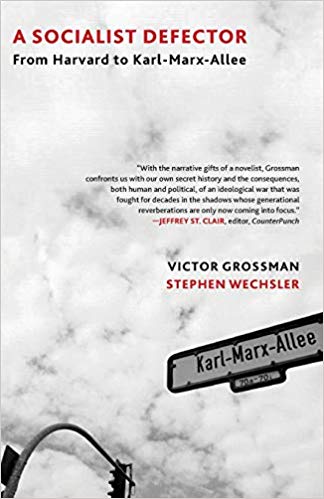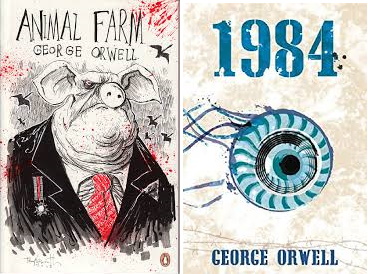Peace and Socialism
Toronto Wet'suwet'en Solidarity March
- Written by Eric Walberg Эрик Вальберг/ Уолберг إيريك والبرغ
Toronto Climate Strike: Let a hundred posters bloom
- Written by Eric Walberg Эрик Вальберг/ Уолберг إيريك والبرغ
The culmination of Toronto’s Global Climate Strike on Friday September 27, 2019 made history. 20,000 demonstrators flooded downtown Toronto with a dazzling array of colourful, often witty, some devastating posters, vowing to stay the course in the battle with corporate society gone mad in a race to destroy the planet.
Here are a few of my highlights (please forgive heads and banners cut off!). I was astounded at the creativity both in image and word. I managed to scribble down 80 (more or less). Not quite Mao's hundred, but i'm sure I missed at least 80 more.
 Leading the march were #FridaysforFuture, S27 Coalition Demands and #Climatestrike
Leading the march were #FridaysforFuture, S27 Coalition Demands and #Climatestrike
Grossman’s A Socialist Defector: Back in the GDR - you don’t know how lucky you are
- Written by Eric Walberg Эрик Вальберг/ Уолберг إيريك والبرغ
 I finished Victor Grossman/ Stephen Wechsler’s* A Socialist Defector: From Harvard to Karl-Marx-Allee (2019) with a sigh of regret. His memoirs of living in East Germany from his defection from the US army in 1951 to his witnessing the post-collapse ’freedom’ was as close to building socialism as I’ll ever get. What a great life he led, quiet, without the rat race, surrounded by socialists living socialistically.
I finished Victor Grossman/ Stephen Wechsler’s* A Socialist Defector: From Harvard to Karl-Marx-Allee (2019) with a sigh of regret. His memoirs of living in East Germany from his defection from the US army in 1951 to his witnessing the post-collapse ’freedom’ was as close to building socialism as I’ll ever get. What a great life he led, quiet, without the rat race, surrounded by socialists living socialistically.
Sure, after 1917, those of us born and bred in the West who wanted to help 'build socialism' could join the appropriate communist party, hurriedly set up by eager enthusiasts in the 1920s. But, as Grossman describes his own experience in the CPUSA in the late 1940s, this was like having your teeth pulled in some modern day Inferno.
For an all too brief 40 years, Germans had the rare chance to free themselves from their capitalist puppet-masters. Some, the best, braved the shrill cries of red, traitor, fool and choose socialism. Thousands of non-Germans did too, escaping death, prison, torture, like Grossman and Chilean socialist Michelle Bachelet, who returned to become president of Chile in 2006. Despite the nightmare conditions of isolation, sabotage, the heavy cultural hand of FRG media pouring lies and distortions, sugar-coated with Camels and nylons. We don’t make our history as we please, but under circumstances existing already, given and transmitted from the past.
Whittaker Chambers or Alger Hiss: Who’s the real traitor?
- Written by Eric Walberg Эрик Вальберг/ Уолберг إيريك والبرغ
 Though #1 on the New York Times Bestseller list for 13 weeks in 1952, beloved of William Buckley and Ronald Reagan ("As long as humanity speaks of virtue and dreams of freedom, the life and writings of Whittaker Chambers will ennoble and inspire."), despite being hailed as "one of the dozen or so indispensable books of the century" (George Will), Witness quickly disappeared from our collective consciousness. We remember its most famous victim, Alger Hiss, as a nice guy who was mercilessly hounded, the prelude to the McCarthy purges of the 1950s, a gruesome stain on US history.
Though #1 on the New York Times Bestseller list for 13 weeks in 1952, beloved of William Buckley and Ronald Reagan ("As long as humanity speaks of virtue and dreams of freedom, the life and writings of Whittaker Chambers will ennoble and inspire."), despite being hailed as "one of the dozen or so indispensable books of the century" (George Will), Witness quickly disappeared from our collective consciousness. We remember its most famous victim, Alger Hiss, as a nice guy who was mercilessly hounded, the prelude to the McCarthy purges of the 1950s, a gruesome stain on US history.
Chambers was a talented writer, penning popular short stories in the New Masses in 1931, a full time editor and journalist at Time. His autobiography is full of details of both sides of the so-called treachery of the times, and Chambers’ own ruminations about love and death and the whole damn thing. It swings from over-the-top self-righteousness to self-abnegation, maniacal zeal as a communist, then as a spy, then as self-proclaimed Mr Right, and woe to anyone standing in the way of his mission to Save the World from Communism.
Like his closeted father, his uncle and brother, all of whom committed suicide, he was possessed by a demon, which drove him to an early grave, working 36-hour days at Time in the 1940s, first doing book reviews, then editing the foreign news page (till he had his second heart attack), then back to books. His fellow journalists resented his new-found conservative attacks on their liberal New Dealer mindset, seeing them all as commie dupes. He immortalized himself destroying the careers of ‘good guys’, Alger Hiss and Harry Dexter White among many others, for their idealistic sins. He became a born-again Quaker, though, like fellow Quaker Richard Nixon, he still believed in ‘just wars’ against commies.
Victims
His worldview was apocalyptic, first through pink lenses, then puritan. Evil is the central problem of human life. The two opposing worldviews: man as flawed/ sinful (Christianity) vs man as good/ perfectable (enlightenment, liberalism -> communism).
Orwell: Neocon icon
- Written by Eric Walberg Эрик Вальберг/ Уолберг إيريك والبرغ
 How do you explain the fact that the John Birch Society used 1984 as its main office telephone number in the 1960s? Or that both Animal Farm and 1984, are force-fed to virtually the entire western world in people’s formative years in their teens, even as Big Brother jacks up repression and surveillance, and pursues ever more cruel and senseless wars?
How do you explain the fact that the John Birch Society used 1984 as its main office telephone number in the 1960s? Or that both Animal Farm and 1984, are force-fed to virtually the entire western world in people’s formative years in their teens, even as Big Brother jacks up repression and surveillance, and pursues ever more cruel and senseless wars?
A look at Orwell’s weaknesses reveals how Big Brother turn the tables on him, getting the last laugh.
Both Animal Farm (1945) and 1984 (1949) are listed on the Random House Modern Library 100 Best Novels of the 20th century (#31 and #13), and have been translated into more than 60 languages, more than any other novels. Orwell “helped prevent the realization of the totalitarian world he described”, according Jeffrey Meyers in Orwell: Wintry Conscience Of A Generation (2001). We are taught in school to revere his warnings against “Thought Police” and the supreme importance of individual rights and freedom of thought.
An antihero’s vaccine
More Articles...
Page 8 of 21





